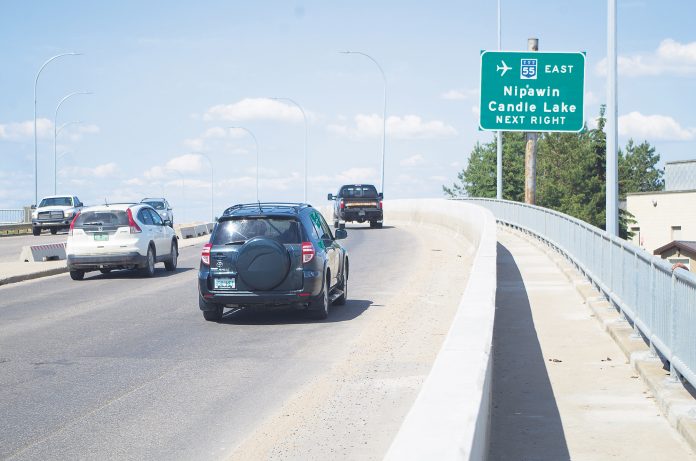Efforts to turn Diefenbaker Bridge into a toll bridge have hit heavy resistance, but Ward 1 Coun. Charlene Miller says the proposal isn’t dead yet.
On Jan. 27, Prince Albert city council voted 5-4 to receive and file a letter from Highways and Infrastructure Minister Greg Ottenbreit, ending attempts to gather further information from the provincial government.
Miller said she was disappointed with the vote, but believes the issue may come up again after Prince Albert residents head to the polls this fall.
“I wouldn’t say it’s dead in the water,” Miller said when asked about the vote. “We have a report now for the next council, perhaps. (I’m) looking forward to one of them maybe asking for that report back and maybe they’re more forward thinking than the rest.”
Miller added that she had no plans to pursue the issue before the next municipal election. However, she holds out hope that the next council could see things differently.
“Like I said, I’ll wait until the next council and we’ll see,” she said. “Maybe there will be some new members and maybe there won’t be. Then we’ll see where we go from there and we’ll see what the new council wants to do.”
Miller thanked Ottenbreit for his response during a short speech at Monday’s council meeting. However, she didn’t like his comments about making changes to the Urban Highway Connector Funding (UHCP) agreement.
Ottenbreit wrote that the province had no desire to implement tolls anywhere in the province, and any attempts to do so would result in “significant impacts on the UHCP funding agreement.”
Miller reiterated that funds from the toll bridge would be used to build a second bridge in Prince Albert. She also argued there was broad public support for the toll, provided local residents didn’t have to pay it. She’s worried Prince Albert residents will end up paying for a new bridge, rather than visiting drivers who use it.
“If we don’t do something like a toll on the bridge (and) the province comes a year from now or two years from now and says, ‘okay, we’re ready to build a bridge, so where’s your third of the money,’ I can tell you that the majority of the time that the third will come from our residents and they will be taxed,” Miller said. “My effort was for them not to be taxed … but now we’re probably looking at a base tax.”
Miller was the first councillor to bring the toll bridge issue forward when she asked for a report exploring the idea back in 2017. However, previous councils have looked at the issue dating back to 2011.
Miller faced strong opposition to her proposal during the last council meeting, with Ward 5 Coun. Dennis Ogrodnick being the most vocal opponent.
Ogrodnick said there were several reasons he couldn’t support a toll, but the biggest was that he did not believe Prince Albert needed a second bridge.
“Right now I can’t see myself voting in favour of taxing the residents of Prince Albert to build a bridge,” he said during the meeting. “Four, five six weekends in the summer is when traffic gets backed up on that bridge. To spend that kind of money, $50 million, $60 million, $70 million, $80 million or however much it is, doesn’t make sense, just to relieve traffic congestion eight or 10 times a year.”
Traffic studies show roughly 24,000 vehicles cross Diefenbaker Bridge every day. That total includes three and four axle commercial vehicles, but not motorcyles, bikes or foot traffic.
Studies also show the Friday before the August long weekend to be the busiest day on the bridge. A total of 29,678 vehicles crossed the bridge on Friday, Aug. 2, 2019. The peak traffic hour was between 4 p.m. and 5 p.m., when 2,527 vehicles crossed.
Mayor Greg Dionne said it’s reasonable to ask the provincial government about a second bridge, since they were part of the P3 partnership that built the new Chief Mistawasis Bridge in Saskatoon. According to original estimates, between 14,600 and 21,700 vehicles were expected to cross Chief Mistawasis Bridge each day, with the number rising to 40,000 once Saskatoon’s population hits 300,000.
However, last November a City of Saskatoon traffic report showed only 9,900 vehicles were crossed the bridge daily.
That must be the new standard for building a bridge, and you can be assured when I see SUMA next week at the conference in Regina, I will be bringing that up,” Dionne told council.
“That issue of the bridge is not dead and I think they’ve opened it wide-open now with their funding of the Saskatoon bridge,” he added. “It’s going to be interesting moving forward.”
Dionne also said the provincial government missed an opportunity by not placing a toll on the new Regina bypass.


